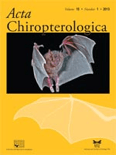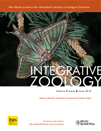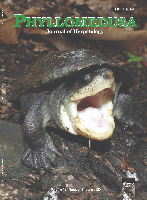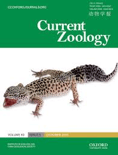
JOURNAL OF ETHOLOGY
Scope & Guideline
Fostering Understanding of Animal Behavior Across Disciplines
Introduction
Aims and Scopes
- Animal Behavior and Ecology:
The journal emphasizes the study of animal behavior in various ecological contexts, examining how behaviors influence survival, reproduction, and interactions with other species. - Evolutionary Perspectives:
Research published in the journal often integrates evolutionary theory, exploring how behaviors have evolved in response to ecological pressures and social dynamics. - Methodological Diversity:
The journal encourages the use of diverse methodologies, including field studies, laboratory experiments, and theoretical modeling, to provide comprehensive insights into behavioral phenomena. - Interdisciplinary Approaches:
The journal supports interdisciplinary research that connects ethology with fields such as neuroscience, genetics, and conservation biology, highlighting the complexity of behavioral traits. - Focus on Specific Species and Groups:
The journal features studies on a wide range of species, from invertebrates to vertebrates, often focusing on specific behavioral traits or ecological interactions.
Trending and Emerging
- Behavioral Adaptations to Environmental Changes:
Research exploring how animals adapt their behaviors in response to changing environmental conditions, such as climate change and urbanization, has gained significant attention. - Human-Wildlife Interactions:
There is a rising interest in studies examining the effects of human activity on animal behavior, particularly in urban ecosystems and conservation contexts. - Social and Cooperative Behaviors:
An increase in research on social structures, cooperative behaviors, and group dynamics among various species highlights the importance of social interactions in behavioral ecology. - Stress and Coping Mechanisms:
Emerging studies focus on the behavioral responses of animals to stressors, investigating how coping mechanisms impact survival and reproductive success. - Chemical Communication and Pheromones:
Research on chemical signaling and the role of pheromones in mating and social interactions has gained traction, reflecting a deeper understanding of communication in ethological studies.
Declining or Waning
- Traditional Behavioral Studies:
There seems to be a shift away from purely observational studies of animal behavior, as more researchers are incorporating experimental or quantitative approaches to understand behavioral patterns. - Static Habitat Studies:
Research focused solely on static habitat characteristics and their influence on behavior has decreased, with a growing emphasis on dynamic interactions and behavioral plasticity. - Simplified Models of Social Behavior:
There is a declining trend in the publication of studies that offer overly simplistic models of social behavior, as the field moves towards more complex and nuanced understandings of social dynamics. - Reduction in Focus on Laboratory Studies:
The journal appears to be moving away from laboratory-based behavioral research, with a greater emphasis on field studies and real-world applications of behavioral research. - Less Emphasis on Non-Ecological Factors:
There is a noticeable decline in studies that do not consider ecological factors in behavioral research, as the field increasingly recognizes the importance of ecological contexts.
Similar Journals

ZOOLOGICHESKY ZHURNAL
Exploring the intricate web of life through ecology and evolution.Zoologichesky Zhurnal, a prominent journal in the field of Ecology, Evolution, Behavior and Systematics, has been a vital publication since its inception in 1950. Published by MAIK Nauka-Interperiodica in the Russian Federation, this journal has established a notable reputation in disseminating scientific research and advancing knowledge in zoology. With its coverage spanning from 1950 to 2023, and a specific convergent focus during 1982-1983, this journal contributes significantly to the ecological and evolutionary sciences, even though it currently holds a Q4 classification in the 2023 category quartiles, indicating its niche positioning among peers. Researchers and students engaged in the study of biological sciences, particularly those interested in the dynamics of ecosystems, behavior of species, and evolutionary processes, will find valuable insights and original research articles within its pages. While access to this esteemed journal is not open, it remains an essential resource for those seeking to deepen their understanding of zoological sciences.

ACTA CHIROPTEROLOGICA
Unveiling the Secrets of Bat EcologyACTA CHIROPTEROLOGICA is a prominent international journal dedicated to the field of bat research, published by the Museum & Institute of Zoology PAS-Polish Academy of Sciences. With its commitment to scholarly excellence, this journal serves as a vital platform for scientists, researchers, and students exploring various aspects of chiropterology, including ecology, behavior, conservation, and taxonomy of bats. The journal has been consistently recognized for its high-quality contributions, holding a commendable Q2 status in the categories of Animal Science and Zoology as of 2023, and ranking #191 out of 490 in Agricultural and Biological Sciences according to Scopus, placing it in the 61st percentile. Although ACTA CHIROPTEROLOGICA does not operate under an open access model, its rigorous peer-review process and focus on innovative research provide invaluable insights and advancements in the understanding of bat biology and conservation. This journal not only bridges the gap between theoretical knowledge and practical applications but also highlights the importance of protecting these key species within our ecosystems. With a history spanning over two decades, from its inception in 1999 to ongoing contributions anticipated through to 2024, ACTA CHIROPTEROLOGICA continues to be an essential reference for anyone invested in the vibrant field of chiropterological research.

ZHURNAL OBSHCHEI BIOLOGII
Advancing Research in Ecology and EvolutionZHURNAL OBSHCHEI BIOLOGII, published by MEZHDUNARODNAYA KNIGA in the Russian Federation, is a venerable journal with a rich history originating in 1945. Renowned for its contributions to the fields of Ecology, Evolution, Behavior, and Systematics, as well as Medicine (miscellaneous), this journal provides a platform for researchers and professionals to disseminate significant findings within these domains. Although currently not classified as an open access publication, ZHURNAL OBSHCHEI BIOLOGII holds a Q4 quartile designation in its respective categories, reflecting its unique positioning within the global research landscape. While its coverage in Scopus is limited, the journal remains an important resource for academics interested in the evolution of biological sciences, especially within the context of Russian research traditions. By fostering scholarly communication and collaboration, ZHURNAL OBSHCHEI BIOLOGII continues to play a critical role in advancing knowledge in the biological sciences.

Integrative Zoology
Fostering Innovation in Zoological ResearchIntegrative Zoology is a distinguished journal published by WILEY, focusing on advancing the field of zoological sciences through the integration of various biological disciplines. With both ISSN 1749-4877 and E-ISSN 1749-4869 identifiers, this journal features research that fosters a deeper understanding of animal biology, ecology, and conservation strategies. As a testament to its impact, Integrative Zoology is recognized within the Q1 category of Animal Science and Zoology in 2023, ranking an impressive #27 out of 490 journals in its field, placing it in the 94th percentile among peers. Published in the United Kingdom, this journal not only serves as a critical platform for novel research but also engages a global audience, inviting submissions that bridge theoretical and practical aspects of zoology. While not entirely open access, the journal remains committed to disseminating high-quality research that contributes substantially to scientific advancements. Through its continuous publication since 2008, Integrative Zoology aims to inspire researchers, educators, and students alike, making it a cornerstone for anyone passionate about the complexities of animal life.

PHYLLOMEDUSA
Championing conservation through accessible scholarly articles.PHYLLOMEDUSA is a distinguished, peer-reviewed journal dedicated to the fields of Animal Science and Zoology and published by UNIV SAO PAULO, ESALQ in Brazil. With an Open Access model in place since 2002, PHYLLOMEDUSA provides a vital platform for the dissemination of research findings, ensuring that quality scholarly articles are freely accessible to a global audience. The journal currently holds a Q3 classification in its category and ranks #375 out of 490 in Scopus, reflecting its commitment to fostering scientific dialogue and advancing knowledge within the community. Covering a diverse range of topics related to amphibian biology, ecology, and conservation, the journal invites contributions from researchers and professionals alike, empowering them to share innovative insights and collaborative studies that address contemporary challenges in zoological sciences. With a converged publishing timeline extending from 2005 to 2024, PHYLLOMEDUSA remains a pivotal resource for academics, students, and practitioners eager to stay abreast of the latest developments in the field.

Current Zoology
Your Gateway to Innovative Zoological DiscoveriesCurrent Zoology, published by Oxford University Press, is a leading open-access journal dedicated to advancing the field of zoology and animal science since its establishment in 2009. With an impressive Q1 ranking in Animal Science and Zoology as of 2023, the journal maintains a prominent position within the academic community, supported by a ranking of #138 out of 490 in Scopus. Current Zoology serves as a vital platform for researchers, professionals, and students, showcasing high-quality research that spans a broad array of topics within the domain of zoology. This journal is characterized by its rigorous peer-review process, ensuring the dissemination of credible and impactful findings that contribute to the understanding of animal biology and conservation efforts. The open-access model enhances accessibility, allowing a wider audience to engage with the pivotal research being conducted in this dynamic field. Processing all manuscripts in an efficient manner and featuring articles that push the boundaries of current knowledge, Current Zoology is your gateway to explore innovative discoveries and trends in zoology.

Journal of Vertebrate Biology
Advancing knowledge in vertebrate biology.Journal of Vertebrate Biology, a reputable publication established by the Institute of Vertebrate Biology in the Czech Republic, serves as a vital platform for research across the fields of Animal Science and Zoology, Aquatic Science, and Ecology, Evolution, Behavior and Systematics. With its ISSN 2694-7684 and a commendable 2023 Q2 ranking in multiple categories, this open-access journal embraces innovative scientific inquiry and fosters academic discourse. The journal's commitment to disseminating high-quality research is reflected in its Scopus rankings, positioning it within the top quartile in several impactful areas. As it continues to converge its focus until 2024, researchers, professionals, and students alike are encouraged to engage with cutting-edge studies that advance our understanding of vertebrate biology. This publication stands out not only in its scholarly contributions but also in enhancing global awareness of biodiversity and conservation issues.

JOURNAL OF ORNITHOLOGY
Connecting Science and Conservation for BirdsJOURNAL OF ORNITHOLOGY, published by Springer Heidelberg, is a leading international journal dedicated to the study of birds and their conservation. With an ISSN of 2193-7192 and an E-ISSN of 2193-7206, this journal serves as a crucial platform for disseminating innovative research focused on avian biology, ecology, and behavior, making significant contributions to the fields of Agricultural and Biological Sciences and Animal Science and Zoology, where it holds a commendable rank of #156 out of 490 in Scopus. Established from 2004 and continuing through 2024, the journal strives not only to advance academic scholarship but also to inform practical conservation efforts globally. While currently not open access, it remains a vital resource for researchers, professionals, and students seeking high-quality studies and findings that influence the understanding and preservation of bird species. The journal's commitment to excellence in science highlights its importance in ornithological research, offering insights that are both profound and actionable.

ACTA ETHOLOGICA
Pioneering Insights into Animal Behavior and SystematicsACTA ETHOLOGICA, published by Springer Heidelberg, is a leading journal in the fields of Animal Science and Zoology, as well as Ecology, Evolution, Behavior, and Systematics. With an ISSN of 0873-9749 and an E-ISSN of 1437-9546, this journal has established itself as a notable platform for innovative research and review articles since its inception in 1998. As of 2023, it holds a Category Quartile of Q3 in both its primary categories, showcasing its commitment to advancing knowledge within these scientific domains. The journal aims to facilitate the dissemination of cutting-edge research on animal behavior and ecology, fostering collaboration among researchers, professionals, and students. While it does not currently offer Open Access options, ACTA ETHOLOGICA remains crucial for those looking to stay informed about the latest developments and trends in ethology. For inquiries, the journal's editorial office is located at Tiergartenstraße 17, D-69121 Heidelberg, Germany.

JOURNAL OF INSECT BEHAVIOR
Exploring the Intricacies of Insect LifeJOURNAL OF INSECT BEHAVIOR, published by SPRINGER/PLENUM PUBLISHERS, stands as a pivotal platform for disseminating cutting-edge research in the fields of insect science and behavioral ecology. Since its inception in 1988, the journal has continuously contributed to our understanding of insect behavior and its ecological implications, boasting an impressive range of studies that address both evolutionary and systemic perspectives. With its current rankings placing it in the Q3 quartile for both Ecology, Evolution, Behavior and Systematics and Insect Science categories, the journal is positioned within the competitive landscape of agricultural and biological sciences, offering insightful contributions to practitioners and academics alike. Although currently not an open-access journal, it ensures wide accessibility through numerous academic institutions and libraries, thereby fostering global collaboration. Researchers, professionals, and students are encouraged to engage with the rich array of articles that not only advance theoretical knowledge but also inform practical applications in managing insect populations and preserving biodiversity.